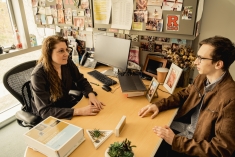Unique BME Co-Op Program Prepares Students for Lifelong Success

Since it launched in 2019, the Biomedical Engineering Co-operative Education program has been meeting the experiential learning needs of students wishing to pursue careers in industry. This unique program allows BME undergraduates to complete a six-month, paid co-op during their junior year with world-class industry partners.
Whether doing traditional benchwork or working in regulatory and quality control positions, participating students gain an understanding beyond the classroom of industry, focus their professional interests, and make important connections.
“Rutgers’ proximity to some of the world’s leading pharmaceutical, biotechnology, and medical device companies motivated us to launch this signature program,” says BME professor and department chair David Shreiber. “It sets us apart and attracts both students and industry partners.”
Century Therapeutics chief technology officer, Greg Russotti, reports that the co-op program “has been a great source of talent for the biotech/pharma industry. Rutgers BME students are highly intelligent, well-trained and motivated, making them valuable contributors during their co-ops and ideal candidates for full time positions when they graduate.”
The game-changing program is overseen by associate professor Kristen Labazzo, who leverages a decade of industry experience, an executive MBA, and a wide-ranging professional network to build the crucial industry partnerships that attract and engage students.
The Sky’s the Limit
Founding program partners such as Celgene, Collagen Matrix, Envigo, Merck, Orthobond, OrthogenRX, held co-op positions for BME students ahead of the students’ start dates, according to Labazzo. “By the time the program started, the inaugural co-op class also included placement at Zimmer, Johnson & Johnson, and the Musculoskeletal Transplant Foundation (MTF), “ she notes. “We now have about 15 partner companies we can consistently count on.”
There are no limits to student participation. “As opportunities come to us, we share them with the students,” says Labazzo. While an average of 13 students have taken part each year, more than 70 BME students have registered internships.
The fledgling program was beginning to build on the success of its first cohort when the pandemic struck, and positions were cut back. “Fortunately, once the world started opening up again,” says Labazzo, “it seemed that the positions were finding us.”
Establishing an Industry Partnership
Alisa Permaul ENG’18 reached out to Labazzo when she was working at Collagen Matrix to help it become the first company to commit to the BME coop program.
For Permaul, the Collagen Matrix partnership made sense. “I was inspired by Dr. Labazzo’s efforts to institute a formal co-op program within the BME department because I knew firsthand what the struggles were to obtain a co-op on my own,” she remembers. “And I knew the value that work experience provided – which is, of course, the biggest benefit to the students.”
As Permaul, who earned her Rutgers MBA in May, sees it, the co-op benefits both students and businesses. “Until students can conceptualize their role in a business environment, they won’t truly understand how to sell their skills on the job market – or understand where they fit in best in an organization” she explains. “As for the businesses, they gain by having a fresh set of eyes and an open mind to question current practices and even develop ways to achieve new goals.”
Kick Starting a Career
Ashley Hufnagel, a post market surveillance quality engineer at Zimmer Biomet reflects how her interviewing and hiring process proceeded more quickly since she had participated in a co-op with the company in 2020. “I didn’t receive an offer directly after my co-op as it was cut short due to COVID-19, but once I applied for a position, I received an email about an hour later.”
The 2021 graduate adds, “the program has had a huge impact on kick starting my career. After completing my co-op, I was able to gauge what kind of company atmosphere I wanted and what I did and did not like about the field – and narrow down the positions and companies I wanted to work for.”
Making Lasting Connections
As an associate bioengineer II at Celgene/BMS, Emily Fitzgerald, who graduated in 2021, has responsibilities ranging from designing and conducting experiments to generating reports and presentations about her data. Her 2020 BME co-op with the company helped her “make connections that will last a lifetime.”
“I don’t think I’d be in this position if it hadn’t been for the co-op,” Fitzgerald insists.
“It certainly helped that they were familiar with me and how I worked with the team when I applied for my full-time position.”
She heartily recommends the program to students who want to go directly into industry after graduation. “It’s a great way to build your professional network and acquire the industry experience you need on your resume for future opportunities,” she says.
Gaining Marketable Professional Skills
The advantages to BME students of learning industry-specific skills while on-the-job are immeasurable, according to Labazzo. “They’re gaining professional skills that almost guarantee employment.”
She adds, “The increase in the number of students who secured full-time employment where they interned or completed co-op is the real proof of our program’s success – and evidence that companies will be coming back for more.”
Industry partner MTF Biologics looks forward, in fact, to welcoming new co-op students this summer, according to R&D senior scientist Meeta Gidwani.
Colleague Evi Chnari, the company’s R&D director describes the program, as “a great resource for MTF Biologics R&D to get access to talented engineers with solid scientific foundation, eagerness to learn and contribute and who are focused on supporting our mission and projects. We look forward to a continued, fruitful collaboration.”


